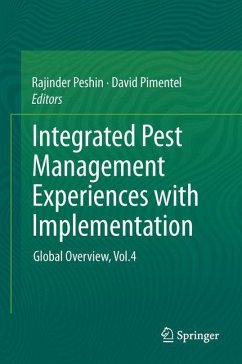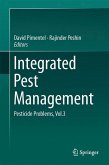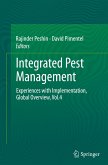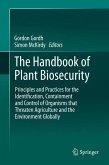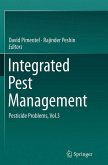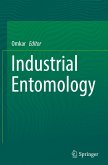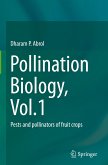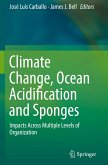Integrated Pest Management
Experiences with Implementation, Global Overview, Vol.4
Herausgegeben:Peshin, Rajinder; Pimentel, David
Integrated Pest Management
Experiences with Implementation, Global Overview, Vol.4
Herausgegeben:Peshin, Rajinder; Pimentel, David
- Gebundenes Buch
- Merkliste
- Auf die Merkliste
- Bewerten Bewerten
- Teilen
- Produkt teilen
- Produkterinnerung
- Produkterinnerung
The book deals with the present state and problems of integrated pest management (IPM) as relating to stakeholder acceptance of IPM and how IPM can become a sustainable practice. The book covers the implementation of integrated pest management in USA, Canada, Denmark, Germany, Italy, Sweden, Netherlands, China, India, Indonesia, Australia, Africa, and its impact in reducing pesticide use in agriculture. The book also deals with the impact of transgenic crops on pesticide use.
Andere Kunden interessierten sich auch für
![Integrated Pest Management Integrated Pest Management]() Integrated Pest Management153,99 €
Integrated Pest Management153,99 €![Integrated Pest Management Integrated Pest Management]() Integrated Pest Management150,99 €
Integrated Pest Management150,99 €![The Handbook of Plant Biosecurity The Handbook of Plant Biosecurity]() The Handbook of Plant Biosecurity246,99 €
The Handbook of Plant Biosecurity246,99 €![Integrated Pest Management Integrated Pest Management]() Integrated Pest Management149,99 €
Integrated Pest Management149,99 €![Industrial Entomology Industrial Entomology]() Industrial Entomology164,99 €
Industrial Entomology164,99 €![Pollination Biology, Vol.1 Pollination Biology, Vol.1]() Dharam P. AbrolPollination Biology, Vol.175,99 €
Dharam P. AbrolPollination Biology, Vol.175,99 €![Climate Change, Ocean Acidification and Sponges Climate Change, Ocean Acidification and Sponges]() Climate Change, Ocean Acidification and Sponges127,99 €
Climate Change, Ocean Acidification and Sponges127,99 €-
-
-
The book deals with the present state and problems of integrated pest management (IPM) as relating to stakeholder acceptance of IPM and how IPM can become a sustainable practice. The book covers the implementation of integrated pest management in USA, Canada, Denmark, Germany, Italy, Sweden, Netherlands, China, India, Indonesia, Australia, Africa, and its impact in reducing pesticide use in agriculture. The book also deals with the impact of transgenic crops on pesticide use.
Produktdetails
- Produktdetails
- Verlag: Springer / Springer Netherlands
- Artikelnr. des Verlages: 978-94-007-7801-6
- 2014
- Seitenzahl: 632
- Erscheinungstermin: 3. Juli 2014
- Englisch
- Abmessung: 241mm x 160mm x 40mm
- Gewicht: 1161g
- ISBN-13: 9789400778016
- ISBN-10: 9400778015
- Artikelnr.: 39361253
- Herstellerkennzeichnung
- Springer-Verlag GmbH
- Tiergartenstr. 17
- 69121 Heidelberg
- ProductSafety@springernature.com
- Verlag: Springer / Springer Netherlands
- Artikelnr. des Verlages: 978-94-007-7801-6
- 2014
- Seitenzahl: 632
- Erscheinungstermin: 3. Juli 2014
- Englisch
- Abmessung: 241mm x 160mm x 40mm
- Gewicht: 1161g
- ISBN-13: 9789400778016
- ISBN-10: 9400778015
- Artikelnr.: 39361253
- Herstellerkennzeichnung
- Springer-Verlag GmbH
- Tiergartenstr. 17
- 69121 Heidelberg
- ProductSafety@springernature.com
Rajinder Peshin is an associate professor at Sher-e-Kashmir University of Agricultural Sciences and Technology of Jammu, India. His Ph.D. is from Punjab Agricultural University, Ludhiana, India, and his research expertise is diffusion and evaluation issues associated with sustainable agriculture research and development programs. Peshin has developed an empirical model for predicting the adoptability of agricultural technologies when put to trial at farmers' fields, and an evaluation methodology for integrated pest management programs. He has published more than 50 scientific papers and chapters of books, and has authored three books. He has also edited two books on integrated pest management, published by Springer in 2009. David Pimentel is a professor of ecology and agricultural sciences at Cornell University, Ithaca, New York, USA. His Ph.D. is from Cornell University. His research spans the fields of energy, ecological and economic aspects of pest control, biological control, biotechnology, sustainable agriculture, land and water conservation, and environmental policy. Pimentel has published over 700 scientific papers and 40 books and has served on many national and government committees including the National Academy of Sciences; President's Science Advisory Council; U.S Department of Agriculture; U.S. Department of Energy; U.S. Department of Health, Education and Welfare; Office of Technology Assessment of the U.S. Congress; and the U.S. State Department.
1. Pesticides Applied Worldwide to Combat Pests.- 2. Integrated Pest Management, BT Crops, and Insecticide Use: The U.S. Experience.- 3. Experiences with Implementation And Adoption of Integrated Pest Management in Northeastern USA.- 4. Emerging issues in Integrated Pest Management implementation and adoption in the North Central USA.- 5. Integrated Pest Management in the Southern United States of America: Changing Technology and Infrastructure - Implications for the Future.- 6. Integrated Pest Management: Fruit Production in the Western United States.- 7. The impact of integrated pest management programs on pesticide use in California, USA.- 8. Experiences with Integrated Weed Management and pesticide use in the Canadian Prairies.- 9. Implementation and Adoption of Integrated Pest Management in Canada: Insects.- 10. The Political Economy of the Indonesian Integrated Pest Management Program during the 1989-1999 Period.- 11. Pesticide Use and Experiences with Integrated Pest Management Programs and Bt Cotton in India.- 12. Experiences with implementation and adoption of Integrated Pest Management in China.- 13. Push-Pull: A Novel IPM Strategy for the Green Revolution in Africa.- 14. Promoting Integrated Pest Management for Cotton Smallholders - the Uganda Experience.- 15. Agent-based models and Integrated Pest Management diffusion in small scale farmer communities.- 16. Pesticides and Integrated Pest Management Practice, Practicality and Policy in Australia.- 17. Integrated Pest Management policy, research and implementation: European initiatives.- 18. Experiences with implementation and adoption of Integrated Plant Protection (IPP) in Germany.- 19. Experiences with implementation and adoption of integrated pest management in Denmark.- 20. Experiences with implementation and adoption of Integrated Pest Management in Italy.- 21. Integrated Pest Management adoption in the Netherlands: experiences with pilot farm networks and stakeholder participation.- 22. Experiences with implementation and adoption of integrated pest management strategies in Sweden.
1. Pesticides Applied Worldwide to Combat Pests.- 2. Integrated Pest Management, BT Crops, and Insecticide Use: The U.S. Experience.- 3. Experiences with Implementation And Adoption of Integrated Pest Management in Northeastern USA.- 4. Emerging issues in Integrated Pest Management implementation and adoption in the North Central USA.- 5. Integrated Pest Management in the Southern United States of America: Changing Technology and Infrastructure - Implications for the Future.- 6. Integrated Pest Management: Fruit Production in the Western United States.- 7. The impact of integrated pest management programs on pesticide use in California, USA.- 8. Experiences with Integrated Weed Management and pesticide use in the Canadian Prairies.- 9. Implementation and Adoption of Integrated Pest Management in Canada: Insects.- 10. The Political Economy of the Indonesian Integrated Pest Management Program during the 1989-1999 Period.- 11. Pesticide Use and Experiences with Integrated Pest Management Programs and Bt Cotton in India.- 12. Experiences with implementation and adoption of Integrated Pest Management in China.- 13. Push-Pull: A Novel IPM Strategy for the Green Revolution in Africa.- 14. Promoting Integrated Pest Management for Cotton Smallholders - the Uganda Experience.- 15. Agent-based models and Integrated Pest Management diffusion in small scale farmer communities.- 16. Pesticides and Integrated Pest Management Practice, Practicality and Policy in Australia.- 17. Integrated Pest Management policy, research and implementation: European initiatives.- 18. Experiences with implementation and adoption of Integrated Plant Protection (IPP) in Germany.- 19. Experiences with implementation and adoption of integrated pest management in Denmark.- 20. Experiences with implementation and adoption of Integrated Pest Management in Italy.- 21. Integrated Pest Management adoption in the Netherlands: experiences with pilot farm networks and stakeholder participation.- 22. Experiences with implementation and adoption of integrated pest management strategies in Sweden.

